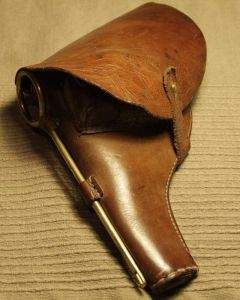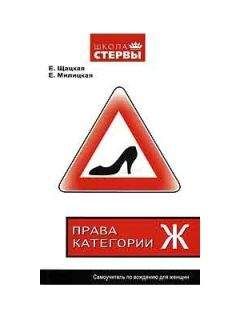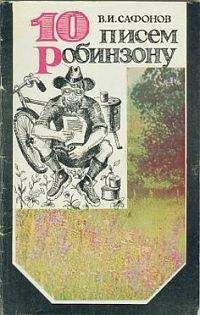Неизвестен Автор - Словарь американских идиом (8000 единиц)
Скачивание начинается... Если скачивание не началось автоматически, пожалуйста нажмите на эту ссылку.
Жалоба
Напишите нам, и мы в срочном порядке примем меры.
Описание книги "Словарь американских идиом (8000 единиц)"
Описание и краткое содержание "Словарь американских идиом (8000 единиц)" читать бесплатно онлайн.
[lay one's cards on the table] or [lay down one's cards] or [put one's cards on the table] <v. phr.>, <informal> To let someone know your position and interest openly; deal honestly; act without trickery or secrets. * /In talking about buying the property, Peterson laid his cards on the table about his plans for it./ * /Some of the graduates of the school were unfriendly toward the new superintendent, but he put his cards on the table and won their support./
[lay oneself open to] <v. phr.> To make oneself vulnerable to; expose oneself. * /If you don't perform your job properly, you will lay yourself open to criticism./
[lay oneself out] <v. phr.>, <informal> To make an extra hard effort; try very hard. * /Larry wanted to win a medal for his school, so he really laid himself out in the race./
[lay one's finger on] See: PUT ONE'S FINGER ON.
[lay one's hands on] or [get one's hands on] <v. phr.> 1. To seize in order to punish or treat roughly. * /If I ever lay my hands on that boy he'll be sorry./ Compare: LAY A FINGER ON. 2. To get possession of. * /He was unable to lay his hands on a Model T Ford for the school play./ Compare: LAY HANDS ON(1). 3. or [lay one's hand on] or [put one's hand on] To find; locate. * /He keeps a file of letters so he can lay his hands on one whenever he needs it./
[lay on the line] or [put on the line] <v. phr.>, <informal> 1. To pay or offer to pay. * /The sponsors had to lay nearly a million dollars on the line to keep the show on TV./ * /The bank is putting $5,000 on the line as a reward to anyone who catches the robber./ Compare: PUT UP. 2. To say plainly so that there can be no doubt; tell truthfully, * /I'm going to lay it on the line for you, Paul. You must work harder if you want to pass./ 3. To take a chance of losing; risk. * /The champion is laying his title on the line in the fight tonight./ * /Frank decided to lay his job on the line and tell the boss that he thought he was wrong./
[lay out] <v. phr.> 1. To prepare (a dead body) for burial. * /The corpse was laid out by the undertaker./ 2. <slang> To knock down flat; to hit unconscious. * /A stiff right to the jaw laid the boxer out in the second round./ 3. To plan. * /Come here, Fred, I have a job laid out for you./ 4. To mark or show where work is to be done. * /The foreman laid out the job for the new machinist./ 5. To plan the building or arrangement of; design. * /The architect laid out the interior of the building./ * /The early colonists laid out towns in the wilderness./ Compare: LAY OFF(1). 6. <slang> To spend; pay. * /How much did you have to lay out for your new car?/ 7. or [lay out in lavender] <slang> To scold; lecture. * /He was laid out in lavender for arriving an hour late for the dance./ Compare: JUMP ON, LAY INTO(2), LET HAVE IT(1c).
[layout] <n.> General situation; arrangement; plan. * /The layout of their apartment overlooking Lake Michigan was strikingly unusual./ Compare: LAID OUT.
[layover] <n.> A stopover, usually at an airport or in a hotel due to interrupted air travel. * /There were several layovers at O'Hare last month due to bad weather./
[lay over] <v.> 1. To put off until later; delay; postpone. * /We voted to lay the question over to our next meeting for decision./ 2. To arrive in one place and wait some time before continuing the journey. * /We had to lay over in St. Louis for two hours waiting for a plane to Seattle./
[lay rubber] or [lay a patch] <v. phr.>, <slang> To take off in a car or a motorcycle so fast that the tires (made of rubber) leave a mark on the pavement. * /Look at those crazy drag racers; they laid rubber in front of my house./
[lay the blame at one's door] <v. phr.> To say that another person or group is responsible for one's own failure. * /The angry coach laid the blame at the door of the players when our college lost the basketball game./
[lay the fault at one's door] See: LAY THE BLAME AT ONE'S DOOR.
[lay their heads together] See: PUT THEIR HEADS TOGETHER.
[lay to] <v.> 1. To give the blame or credit to; to name as cause. * /He was unpopular and when he made money, it was laid to his dishonesty, but when he lost money, it was laid to his stupidity./ Compare: LAY AT ONE'S DOOR. 2. To hold a ship or boat still against the wind. * /The pirates decided to lay to that night and go ashore in the morning./ Compare: LIE TO. 3. To exert oneself; to work hard. * /He picked up a shovel and laid to with the rest of the gang./
[lay to heart] See: TAKE TO HEART.
[lay to rest] <v. phr.>, <informal> 1. To put a dead person into a grave or tomb; bury. * /President Kennedy was laid to rest in Arlington National Cemetery./ 2. To get rid of; put away permanently; stop. * /The Scoutmaster's fears that Tom had drowned were laid to rest when Tom came back and said he had gone for a boat ride./ * /The rumor that the principal had accepted another job was laid to rest when he said it wasn't true./
[lay up] <v.> 1. To collect a supply of; save for future, use; store. * /Bees lay up honey for the winter./ 2. To keep in the house or in bed because of sickness or injury; disable. * /Jack was laid up with a twisted knee and couldn't play in the final game./ 3. To take out of active service; put in a boat dock or a garage. * /Bill had to lay up his boat when school started./ * /If you lay up a car for the winter, you should take out the battery./
[lay waste] <v. phr.>, <literary> To cause wide and great damage to; destroy and leave in ruins; wreck. * /Enemy soldiers laid waste the land./
[lead] See: ALL ROADS LEAD TO ROME, BLIND LEADING THE BLIND.
[lead] See: GET THE LEAD OUT OF ONE'S PANTS.
[lead a dog's life] <v. phr.>, <informal> To live a hard life, work hard, and be treated unkindly. * /A new college student of long ago led a dog's life./
[lead a merry chase] <v. phr.> To delay or escape capture by (someone) skillfully; make (a pursuer) work hard. * /The deer led the hunter a merry chase./ * /Valerie is leading her boyfriend a merry chase./
[lead by the nose] <v. phr.>, <informal> To have full control of; make or persuade (someone) to do anything whatever. * /Many people are easily influenced and a smart politician can lead them by the nose./ * /Don't let anyone lead you by the nose; use your own judgment and do the right thing./
[leader] See: MAJORITY LEADER, MINORITY LEADER.
[lead-footed] See: HEAVY-FOOTED.
[leading light] <n. phr.> A prominent person in a community, company, or group. * /Alan is the leading light of our discussion group on music./
[lead off] <v.> To begin; start; open. * /Richardson led off the inning with a double./ * /We always let Henry lead off./ * /Mr. Jones led off with the jack of diamonds./ * /When the teacher asked if the film helped them to understand, Phil led off by saying that he learned a lot from it./
[lead on] <v. phr.> To encourage you to believe something untrue or mistaken. * /Tom led us on to believe that he was a world traveler, but we found out that he had never been outside our state./ * /We were led on to think that Jeanne and Jim were engaged to be married./
[lead one a merry dance] <v. phr.> To cause someone unusual discomfort or expense; tire someone by causing one to overdo. * /With her personal extravagances and constant social activities that cost a fortune, Carol led her husband a merry dance./
[lead the way] <v. phr.> To go before and show how to go somewhere; guide. * /The boys need someone to lead the way on their hike./ * /The men hired an Indian to lead the way to the Pueblo ruins./ * /That school led the way in finding methods to teach reading./
[lead to] <v. phr.> To result in. * /Such a heavy arms race can only lead to war./
[leaf] See: TURN OVER A NEW LEAF.
[leaf through] <v. phr.> To scan or glance through a book or other reading matter. * /I only had time to leaf through the program before the concert started./
[league] See: IN LEAGUE WITH, IVY LEAGUE.
[leaguer] See: TEXAS LEAGUER.
[leak out] <v. phr.> To become known; escape. * /The famous beauty queen tried to keep her marriage a secret, but news of it soon leaked out./
[leak to] <v. phr.> To purposely let a secret be known, as if conveying it in the strictest confidence. * /The movie star's secret divorce was leaked to the tabloids by her housekeeper./
[lean on] <v. phr.>, <slang>, <informal> To pressure (someone) by blackmailing, threats, physical violence, or the withholding of some favor in order to make the person comply with a wish or request. * /I would gladly do what you ask if you only stopped leaning on me so hard!/
[lean over backward] See: BEND OVER BACKWARD.
[lean-to] <n.> 1. A shed for tools, such as spades, hoes, etc., attached to the wall of a house, * /Joe looked for the garden hose in the lean-to./ 2. A small cabin in the country. * /They spend their weekends in their modest lean-to in Wisconsin./
[leap] See: BY LEAPS AND BOUNDS.
[leap year] <n.> Every fourth year during which the month of February contains 29 rather than 28 days. * /During a leap year one must wait a day longer for one's February pay check./
[learn] See: LIVE AND LEARN.
[learn by heart] See: BY HEART.
[learn by rote] <v. phr.> To blindly memorize what was taught without thinking about it. * /If you learn a subject by rote, it will be difficult to say anything original about it./
[learn one's way around] See: KNOW ONE'S WAY AROUND.
[learn the hard way] See: HARD WAY.
[learn the ropes] See: THE ROPES.
[least] See: AT LEAST, IN THE LEAST, LAST BUT NOT LEAST, LINE OF LEAST RESISTANCE.
[leatherneck] <n.>, <slang>, <informal> A member of the United States Marine Corps. * /I didn't know your son Joe became a leatherneck./
[leave] See: SHORE LEAVE, TAKE IT OR LEAVE IT, TAKE LEAVE OF, TAKE ONE'S LEAVE.
[leave a bad taste in one's mouth] <v. phr.> To feel a bad impression; make you feel disgusted. * /Seeing a man beat his horse leaves a bad taste in your mouth./ * /His rudeness to the teacher left a bad taste in my mouth./
[leave alone] See: LET ALONE.
[leave at the altar] <v. phr.> 1. To decide not to marry someone in the last minute; jilt. * /Ed left poor Susan at the altar./ 2. To overlook and skip for promotion; not fulfill deserved expectation. * /Once again I didn't get my promotion and was left at the altar./
[leave behind] <v. phr.> 1. Abandon. * /Refugees on the run must sometimes leave old and sick people behind./ 2. To forget; go away without. * /We had reached our car when we noticed that we had left our keys behind./
[leave flat] <v. phr.>, <informal> To quit or leave suddenly without warning when wanted or needed; desert; forsake; abandon. * /Sam found that being a member of the trail-clearing group was a lot of hard work, so he left them flat./ * /My car ran out of gas and left me flat, ten miles from town./ Compare: LEAVE IN THE LURCH, WALK OUT(2).
[leave hanging] or [leave hanging in the air] <v. phr.> To leave undecided or unsettled. * /Because the committee could not decide on a time and place, the matter of the spring dance was left hanging./ * /Ted's mother didn't know what to do about the broken window, so his punishment was left hanging in the air until his father came home./ Compare: UP IN THE AIR.
[leave high and dry] See: HIGH AND DRY.
[leave holding the bag] or [leave holding the sack] <v. phr.>, <informal> 1. To cause (someone) not to have something needed; leave without anything, * /In the rush for seats, Joe was left holding the bag./ 2. To force (someone) to take the whole responsibility or blame for something that others should share. * /When the ball hit the glass, the team scattered and left George holding the bag./ * /After the party, the other girls on the clean-up committee went away with their dates, and left Mary holding the bag./
[leave in the lurch] <v. phr.> To desert or leave alone in trouble; refuse to help or support. * /The town bully caught Eddie, and Tom left him in the lurch./ * /Bill quit his job, leaving his boss in the lurch./ Compare: LEAVE FLAT, HIGH AND DRY(2), WALK OUT(2).
[leave it at that] <v. phr.> To avoid further and more acrimonious disagreement; not argue or discuss any further. * /Our opinion on health care is obviously different, so let's just leave it at that./
[leave no stone unturned] <v. phr.> To try in every way; miss no chance; do everything possible. - Usually used in the negative. * /The police will leave no stone unturned in their search for the bank robbers./ Compare: ALL OUT, BEND HEAVEN AND EARTH, FINE-TOOTH COMB.
[leave off] <v.> To come or put to an end; stop. * /There is a high fence where the school yard leaves off and the woods begin./ * /Don told the boys to leave off teasing his little brother./ * /Marion put a marker in her book so that she would know where she left off./ Contrast: TAKE UP.
[leave one's mark] <v. phr.> To leave an impression upon; influence someone. * /Tolstoy never won the Nobel Prize, but he left his mark on world literature./ See: MAKE ONE'S MARK.
[leave open] <v. phr.> To remain temporarily unsettled; subject to further discussion. * /Brad said that the question of health insurance would be left open until some future date./
[leave out] <v. phr.> To skip; omit. * /The printer accidentally left out two paragraphs from Alan's novel./
[leave out in the cold] See: OUT IN THE COLD.
[leave out of account] <v. phr.> To fail to consider; forget about. * /The picnic planners left out of account that it might rain./ Contrast: TAKE INTO ACCOUNT.
[leave-taking] See: TAKE ONE'S LEAVE.
[leave the matter open] See: LEAVE OPEN.
[leave well enough alone] See: LET WELL ENOUGH ALONE.
[leave without a leg to stand on] See: LEG TO STAND ON.
[leave word with] <v. phr.> To leave a message. * /Hank left word with his secretary where he could be reached by phone while he was away from his office./
[left] See: OUT IN LEFT FIELD, RIGHT AND LEFT.
[left field] <n.> 1. The part of a baseball out-field to the batter's left. * /Right-handed batters usually hit to left field./ Compare: CENTER FIELD, RIGHT FIELD. 2. See: OUT IN LEFT FIELD. - [left fielder] <n.> The player in baseball who plays in left field. * /The scoreboard in the ball park is on the fence behind the left fielder./
[left-handed] <adj.>, <informal> 1. Using the left hand habitually. 2. Crooked; phoney; homosexual. * /Morris is such a left-handed guy./ 3. Clumsy; untoward; awkward. * /Grab that hammer and stop acting so left-handed./
[left-handed compliment] An ambiguous compliment which is interpretable as an offense. * /I didn't know you could look so pretty! Is that a wig you're wearing?/
[left-wing] <adj.> That which is or belongs to a group of people in politics that favors radical change in the direction of socialism or communism. * /The left-wing faction called for an immediate strike./
Подписывайтесь на наши страницы в социальных сетях.
Будьте в курсе последних книжных новинок, комментируйте, обсуждайте. Мы ждём Вас!
Похожие книги на "Словарь американских идиом (8000 единиц)"
Книги похожие на "Словарь американских идиом (8000 единиц)" читать онлайн или скачать бесплатно полные версии.
Мы рекомендуем Вам зарегистрироваться либо войти на сайт под своим именем.
Отзывы о "Неизвестен Автор - Словарь американских идиом (8000 единиц)"
Отзывы читателей о книге "Словарь американских идиом (8000 единиц)", комментарии и мнения людей о произведении.



















